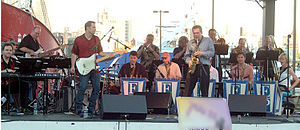Ed Palermo Big Band
| The Ed Palermo Big Band | |
|---|---|
 |
|
| Background information | |
| Genres | Jazz, rock |
| Years active | 1977–present |
| Labels | Vile Heifer, Pro Jazz, Astor Place, Cuneiform |
| Website | www |
| Members |
|
The Ed Palermo Big Band is a big band that has been active for over thirty years, playing the compositions and arrangements of their leader, saxophonist Ed Palermo. The band is known for Palermo's arrangements of the music of Frank Zappa.
Ed Palermo started playing the alto saxophone and the guitar in high school. By that time he knew he wanted to be a musician. Early influences that pushed him in that direction were the Beatles and the Mothers of Invention. Palermo also discovered a love for the music of Edgar Winter while in high school. This inspired him to emulate musicians such as Cannonball Adderley, Phil Woods, and Charlie Parker. In college he switched from alto saxophone to tenor saxophone due to influences from John Coltrane, Michael Brecker, and David Liebman. After graduating college, Palermo moved to New York in order to become a jazz tenor saxophonist. At this point, an album called "Impact" by Charles Tolliver inspired him to try his hand at arranging. Palermo looked to his friend Dave LaLama, already an arranger, for advice and he began to compose and arrange music. Soon he began playing with Tito Puente, and during this time Palermo assembled a group which later expanded into the Ed Palermo Big Band.
In 1977 Ed Palermo assembled a nine-piece band to play his own compositions. The band expanded into a big band and began a three year residency at a New York club called Seventh Avenue South. During this time the band played primarily compositions by Palermo and his arrangements of other music. After three years, the Ed Palermo Big Band was replaced by Gil Evans.
In 1982 the Ed Palermo Big Band recorded their first LP and released it as Ed Palermo under a label called Vile Heifer. Later the LP became known as Papier Mache after the first song on the album. This LP featured guests such as Randy Brecker, David Sanborn, and Edgar Winter. The material on this album was mostly Palermo's original work, except for a few pieces that were co-written.
...
Wikipedia
